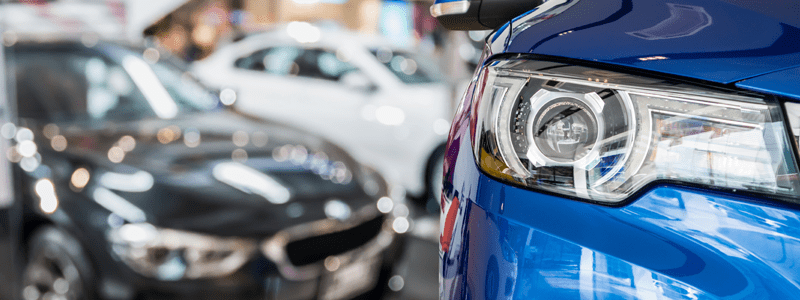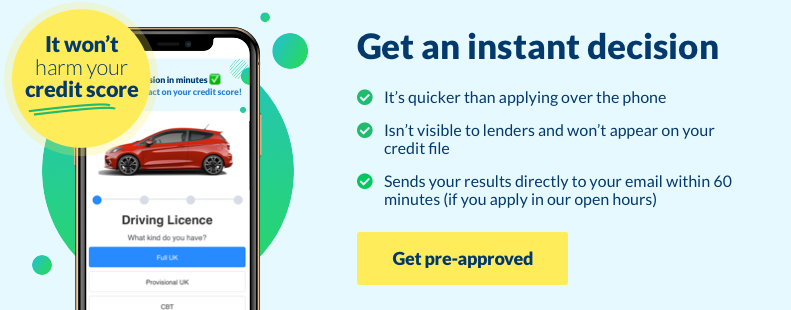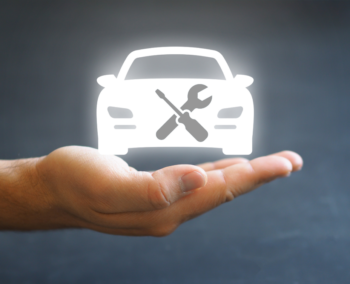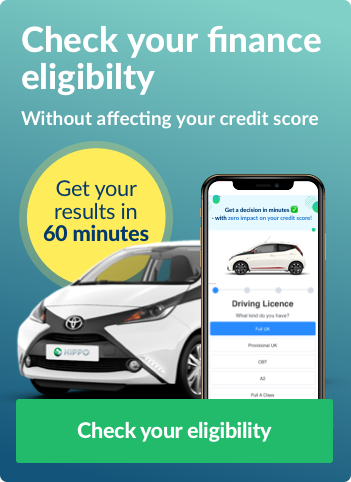
It’s not always possible to fund a large purchase, like a new or used car, with cash. But is getting a car on finance a good idea? Answer these eight questions to help you make your decision.
1. What kind of car finance do you want?
There are a few car finance options out there, and deciding which one you use depends on what you want from your agreement and your financial situation.
Even if you have the cash to buy a car in one go, it still might not be the best option.
Hire Purchase (HP)
With a hire purchase agreement, you pay a deposit and spread the rest of the balance, alongside interest, over the course of, usually, one to five years. The monthly payments are fixed, and at the end of the term, you own the car.
Good for: Those who have a decent deposit, want fixed monthly payments, and want to either own the car in the long run, use it as a part-exchange or sell in the future.
Read: What is hire purchase and how does it work?
Personal Contract Purchase (PCP)
Choose PCP, and you’ll pay a fixed number of payments over the course of, usually, one to five years. At the beginning of the contract, the finance provider will estimate what the car should be worth at the end of the term. When the contract ends, you can either pay a final sum to own the car outright, hand it back or part-exchange it for another car.
Good for: Those who like lower monthly payments, want to change their car every few years or would like access to a higher spec car than their budget would usually afford.
Read: What is personal contract purchase and how does it work?
Personal Contract Hire (PCH)
With PCH, for a lower fixed monthly fee, you’ll be able to drive, typically, a brand-new car, which can be serviced and maintained by the leaser if you add a maintenance pack. You’ll never own the car, nor is there the option to purchase it when the contract ends.
Good for: Those who don’t want to be tied down by car ownership but want cheaper monthly payments, want to change their car frequently, and want to drive a more expensive car than their budget would normally allow.
2. Can you afford the monthly payments?
When asking if getting a car on finance is a good idea, you need to figure out whether it’s affordable. Almost all car finance agreements work on the idea of spreading the cost and come with monthly repayments.

Missing payments can, at best, lead to late payment charges or fees. At worst, it can severely damage your credit rating, making it harder to get credit in the future or even see your car repossessed.
Think of your future finances, too. Your income may be steady right now, but what would happen if your finances change?
3. How much time do you have?
Often having access to a car is a necessity for work or family reasons. However, if it’s more of a want than a need, would you be better off saving up?
Buying a car with cash has the obvious advantage of being a one-off purchase with no credit checks or interest rates to worry about.
However, there are some disadvantages to buying a car outright, too, such as being limited by your budget and not being able to afford the car you necessarily want. On top of that, the responsibility of maintaining the car falls solely on you.
If you can’t wait, getting a car on finance can be a good idea. It’s usually easy to apply for, and you could be approved and behind the wheel the same day.

4. Is your credit score good enough?
Again, if you have some leeway as to when you buy your car, working on your credit score could save you a lot of money.
If you have a poor credit rating, you won’t be able to take advantage of the better car finance deals.
It obviously also depends on your current financial situation, too, as if you’re still struggling with debt, do you feel confident you could manage monthly car repayments on top of that?
At Hippo Motor Finance, we have access to specialist lenders for bad credit. If you want to learn more about credit, credit scores and bad credit car finance, you can visit our bad credit hub.
5. How much are you willing to spend?
Do you need a new car or would a used car be better idea. You can get both with car finance. However, obviously a used car usually has the advantage of being cheaper.

Then again, if you’re interested in buying a new car, we offer £0 deposit options on all our vehicles.
It’s best to work out your overall costs, factoring in everything from servicing and insurance to fuel and interest rates.
Don’t forget, with car finance such as PCP, there could also be mileage restrictions, and should you exceed them, there may be penalty fees.
6. Do you have plans for the car?
Most car finance plans will not let you modify the car without permission from the finance company.
As the car doesn’t belong to you until you’ve made all the payments (and a final sum at the end if it’s a PCP deal), you can’t change it in any way.
So, if you’ve got your heart set on modifications, it’s probably best to find an alternative so you can purchase the car outright.
Either that or if you really want to lease, for example, be prepared to remove the modifications you’ve made at the end of your agreement and restore the vehicle to its former appearance.
7. Have you considered the future?
Car finance options can run up to five years, sometimes longer, but if you think you might not want your new vehicle for that long, you should consider whether it’s worth having a loan lasting longer than the length of time you plan to own the car.
Factor in the cost of depreciation, too, as when you buy a car through finance, you’ll start paying for depreciation the minute you drive it away.
This is more something to consider in the case of hire purchase, as it’s one you won’t typically notice until you come to sell it.
Read: Is it better to part exchange your car or sell it privately?
8. How risk-averse are you?
There’s a certain element of risk with all financial decisions, and it’s no different with car finance.
For instance, if your financial circumstances change while you’re still paying for the car, it could have a lasting effect on your overall finances and your credit rating, too. In some cases, the car could be repossessed, leaving you with no vehicle.
PCP deals come with restrictions, too, such as mileage, which can lead to penalties should you exceed the agreed terms.
And damages to the car while you’re still paying the finance company – regardless of which car finance plan you’re on – could see you out of pocket.
If you’re wondering whether getting a car on finance is a good idea, you’ll need to weigh up the risks and restrictions of the deal you want to take before deciding how to purchase the vehicle.
Still questioning whether getting a car on finance is a good idea? Why not find out more about your options?

At Hippo Motor Finance, we can discuss the different car finance options, weigh up the pros and cons and discuss what might be right for your circumstances.
Contact us today and see if we can help find you the right car and the right finance deal for you.
Or, if you’re ready, see if you’ll be approved in minutes using our online Apply Now feature without affecting your credit score.














